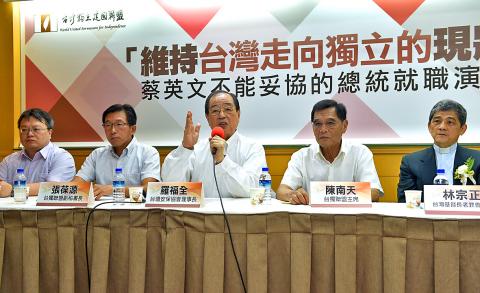Pro-independence groups yesterday urged president-elect Tsai Ing-wen (蔡英文) not to make any concessions to China and to assert Taiwanese identity by focusing her inauguration speech on public opinion rather than “China policy” as her predecessor did.
Taiwan National Security Institute president Lo Fu-chen (羅福全) said Tsai does not need to mention the so-called “1992 consensus,” but should instead declare her resolve to lead the nation in developing a global perspective.
The “1992 consensus” refers to a tacit understanding between the Chinese Nationalist Party (KMT) and the Chinese government that both sides of the Taiwan Strait acknowledge there is “one China,” with each side having its own interpretation of what “China” means.

Photo: Chien Jung-fong, Taipei Times
“Tsai’s inauguration speech is not just for Taiwan and China, but the whole world. She does not need to bring up the ‘1992 consensus,’ which is a fabrication and does not exist. What she has to make clear is the opinions of Taiwanese,” Lo said. “According to several polls, more than 70 percent of Taiwanese believe that Taiwan is not part of China, and Taiwan is their nation.”
Lo said he hoped Tsai’s speech would not be limited to economic policies, because a more important thing is to make Taiwan a member of the international community.
“Taiwan is internationally recognized as a democratic country that does not belong to China and, hopefully, Tsai can say something like ‘Taiwan has to go global and make contributions to international society,’” he said.
World United Formosans for Independence chairman Chen Nan-tien (陳南天) said the Chinese government and President Ma Ying-jeou (馬英九) are putting pressure on the new government as they try to keep Taiwan dependent on China, but most people identify themselves as Taiwanese instead of Chinese, and it is high time to steer away from the “one China” framework.
Tsai, as the head of a sovereign state, should make her inauguration speech with the public in mind and should not be swayed by foreign forces, Flanc Radical spokesman Ho Cheng-hui (何澄輝) said, adding that it would be ridiculous to respond to China’s expectations,.
“The fictitious ‘1992 consensus’ not only allows China to intervene in Taiwan, but also undermines Taiwanese democracy,” Ho said.
“The greatest significance of this transfer of power [from the KMT to the Democratic Progressive Party] is the denial of the 1992 consensus and Chinese values, as well as the reassertion of democratic values,” Ho said.
The foundation of the new government is not China’s will, but “the will of Taiwanese,” which is what gives authority and legitimacy to future administrations, Fu Jen Catholic University philosophy professor Shen Ching-kai (沈清楷) said.
Tsai would be limiting herself to the “one China” framework should she acknowledge the “1992 consensus,” thereby continuing the Ma administration’s policy to maintain the “status quo” of “moving toward unification,” Shen said.
The Tsai administration would be heading into a storm should it betray the public, Shen added.

Chinese spouse and influencer Guan Guan’s (關關) residency permit has been revoked for repeatedly posting pro-China videos that threaten national security, the National Immigration Agency confirmed today. Guan Guan has said many controversial statements in her videos posted to Douyin (抖音), including “the red flag will soon be painted all over Taiwan” and “Taiwan is an inseparable part of China,” and expressing hope for expedited reunification. The agency last year received multiple reports alleging that Guan Guan had advocated for armed reunification. After verifying the reports, the agency last month issued a notice requiring her to appear and explain her actions. Guan

GIVE AND TAKE: Blood demand continues to rise each year, while fewer young donors are available due to the nation’s falling birthrate, a doctor said Blood donors can redeem points earned from donations to obtain limited edition Formosan black bear travel mugs, the Kaohsiung Blood Center said yesterday, as it announced a goal of stocking 20,000 units of blood prior to the Lunar New Year. The last month of the lunar year is National Blood Donation Month, when local centers seek to stockpile blood for use during the Lunar New Year holiday. The blood demand in southern Taiwan — including Tainan and Kaohsiung, as well as Chiayi, Pingtung, Penghu and Taitung counties — is about 2,000 units per day, the center said. The donation campaign aims to boost

The Kaohsiung Tourism Bureau audited six hotels in an effort to prevent price gouging ahead of Korean band BTS’ concert tour in the city scheduled for Nov. 19, 21 and 22 this year. The bureau on Friday said that the audits — conducted in response to allegations of unfair pricing posted on social media — found no wrongdoing. These establishments included the local branches of Chateau de Chine, Hotel Nikko, My Humble House, and Grand Hai Lai, it said, adding that the Consumer Protection Commission would have penalized price gougers had the accusations been substantiated. The bureau said the Tourism Development Act

The Central Weather Administration (CWA) said a magnitude 4.9 earthquake that struck off the coast of eastern Taiwan yesterday was an independent event and part of a stress-adjustment process. The earthquake occurred at 4:47pm, with its epicenter at sea about 45.4km south of Yilan County Hall at a depth of 5.9km, the CWA said. The quake's intensity, which gauges the actual effects of a temblor, was highest in several townships in Yilan and neighboring Hualien County, where it measured 4 on Taiwan's seven-tier intensity scale, the CWA said. Lin Po-yu (林柏佑), a division chief at the CWA's Seismological Center, told a news conference